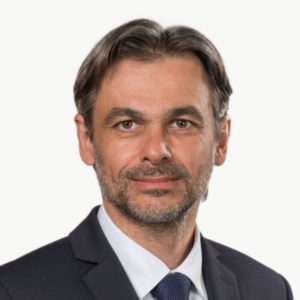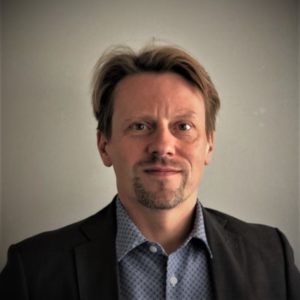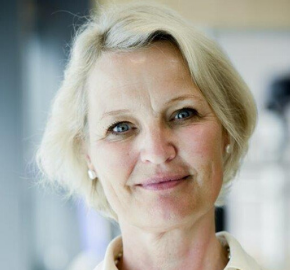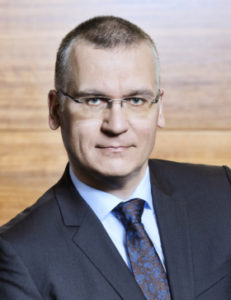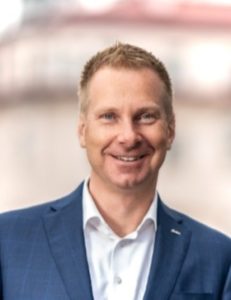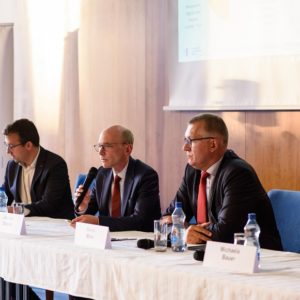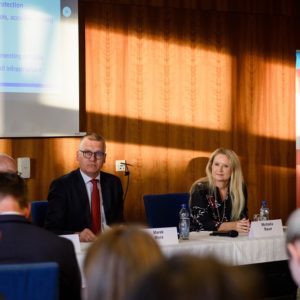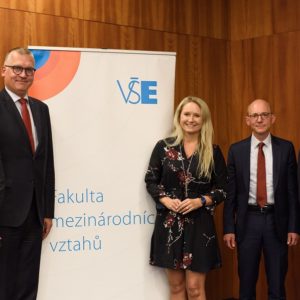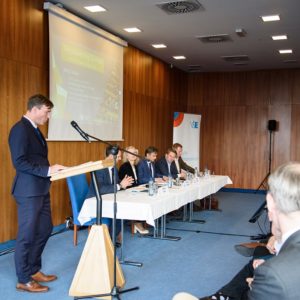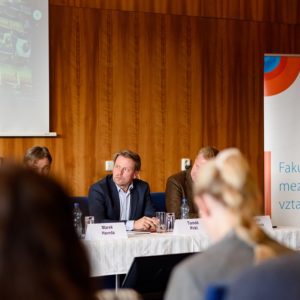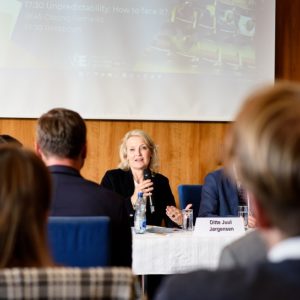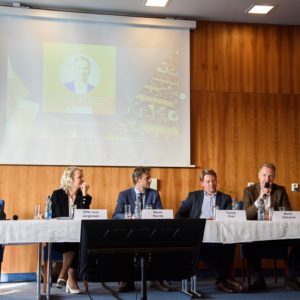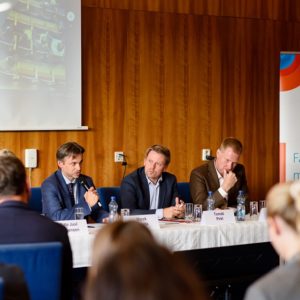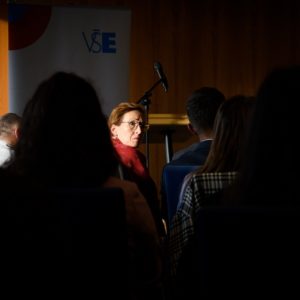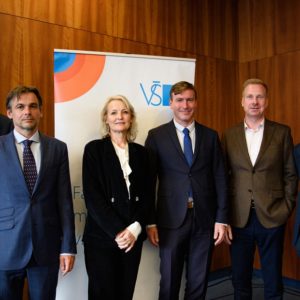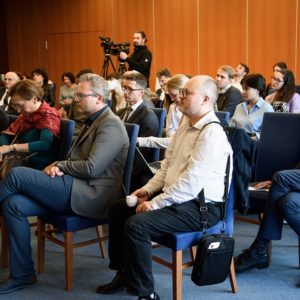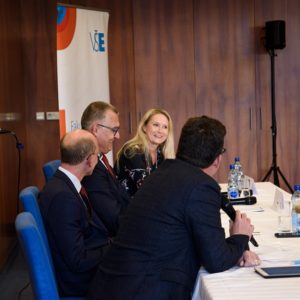FIR Annual Conference 2022: Repowering Europe
On Tuesday 11 October, the FIR Annual Conference was held at the Faculty of International Relations. This time the main theme was “Repowering Europe”.
Watch the recording of the FIR Annual Conference 2022: Repowering Europe!
Like every year, the conference took the form of an audience panel discussion with prominent faces from the international corporate world and leading government officials. The packed programme was opened by the Dean of the faculty Josef Taušer, who after his introduction handed over the floor to the moderators of the event, Dr. Jarolím Antal, who commented on the first part of the debate, and the Vice-Rector of the Prague University of Economics and Business Pavel Hnát, who moderated the discussion that followed the coffee break. As the title of the conference suggests, the whole event was linked by the theme of the ongoing energy crisis in the world as a result of the war in Ukraine. In the second part of the programme, guests tried to answer the question of Europe’s future in response to current events not only within its borders.
The invitation to this year’s conference was accepted by Ditte Juul Jorgensen (Director General, DG Energy, European Commission), Marek Havrda (Deputy Minister, Ministry of EU Affairs, Czechia), Tomáš Pirkl (Head of Brussels Representative Office, CEZ Group) and Martin Záklasník (Member of the Board of Directors of the Czech-German Chamber of Commerce and Industry and Aspen Institute CE), who in the first part of the discussion focused mainly on the energy crisis. Mrs Jorgensen pointed out that the events of the last few days have confirmed how important it is not to be dependent on gas largely from only one supplier – Russia. The key to overcoming the current crisis is, not least in her view, to stabilise market prices, to reduce our consumption by unnecessary expenditure and to turn our attention to building relations with other mineral-rich countries – Norway, the US, Egypt – in order to diversify Europe’s energy intake.
At the same time, according to other guests, demands for the rapid introduction of renewable energy should increase. Moreover, Marek Havrda adds that the current situation was not helped by the subdued investment during the global pandemic that preceded it, and in many parts of the world, the economies did not have time to recover from its effects. Mr Havrda believes that it is international trade that should help solve the energy crisis.
In addition, Mr Martin Záklasník and Mr Tomáš Pirkl highlighted the problem of the lack of liquidity in the economy and the need to stabilise market prices as quickly as possible. All the panellists agreed that inflation was making an already difficult situation even more serious for the general public, which is why it should be tackled first and foremost. The question remains, however, which method would be the most effective for efficient monetary operations.
A similar question was raised in the second part of the discussion chaired by the Vice-Rector of the University of Economics Pavel Hnát. Representatives of the banking sector, Marek Mora (Deputy Governor of the Czech National Bank), Jochen Schanz (Senior Economist, European Investment Bank) and Michaela Bauer (Chief Innovation Officer, Member of the Board of Directors, ČSOB Group), did not avoid questions about the original erroneous inflation forecasts. However, Mr Mora said that none of the central banks in the world had expected a similar development of the price level.
The rest of the second part of the debate, however, partly abandoned inflation and negative scenarios and headed into the near, perhaps slightly more positive, future. A future in the name of the development of artificial intelligence, advanced robotics and other trends that are currently beginning to gain in seriousness, not only in the financial sector. However, the host Pavel Hnát pointed out that many people are afraid of the digitalised future. However, the guests agreed that society has already managed to successfully adapt to similar changes in commonly perceived paradigms and systems in use several times. The Internet of Things, artificial intelligence or robotization may thus seem unimaginable to many, yet it can be expected to one day bring to society a comparably substantial improvement in the quality of everyday life, just as the industrial revolutions of the past did.
All the invited guests and speakers highlighted the complexity and interconnectedness of the challenges the world is currently facing. Although each of them works in a different institution and valued each part of the crisis with different seriousness, they agreed on the most appropriate solutions. But whether we start with price stabilisation, investment recovery, consumption reduction or green policies, one thing is certain. We are all facing the crisis indiscriminately, and we can therefore only defeat it together. In a stronger Europe.
Program
- 15:30 Conference Opening
-
Prague University of Economics and Business
Josef Taušer, Dean, Faculty of International Relations, Prague University of Economics and Business
- 15:45 Energy Crisis in Europe
-
Moderator: Jarolim Antal, Director, Centre for European Studies, Faculty of International Relations, Prague University of Economics and Business
Ditte Juul Jorgensen, Director General, DG Energy, European Commission
Marek Havrda, Deputy Minister, Ministry of EU Affairs, Czechia
Tomáš Pirkl, Head of Brussels Representative Office, CEZ Group
Martin Záklasník, Former Director of E.ON Czechia, Consultant
- 17:00 Coffee Break
- 17:30 Unpredictability: How to face it?
-
Moderator: Pavel Hnát, Vice-Rector, Associate Professor in World Economy
Jochen Schanz, Senior Economist, European Investment Bank
Marek Mora, Deputy Governor, Czech National Bank
Michaela Bauer, Chief Innovation Officer, Member of Board of Directors, ČSOB Group
- 18:45 Closing Remarks
- 19:00 Reception
Speakers
Host

Josef Taušer graduated in International Trade at Faculty of International Relations, Prague University of Economics and Business. Since 2003 he works at the Department of International Trade. Currently, he is guarantor of the Master’s degree in International Trade and Deputy Head of the Department. In 2008 he was appointed associate professor and in 2012-2013 he served as vice-dean for science and as legal representative of the dean. Josef Taušer regularly lectures at universities in France (AUDENCIA School of Management, Nantes, Lyon IAE) and Austria (WU Wien), where he teaches international financial management, in English and German.
He is author of numerous papers in journals with impact factor, co-author of 3 books, and of another 17 peer-reviewed articles. He participated in international and national scientific projects and is a member of the executive boards 5 academic journals. Josef is also member of the Board at the Academy of Business, CEE Chapter (AIB-CEE).
Moderators

Pavel Hnát is an associate professor in the Department of International Economic Relations, and since 2022 he has been vice-rector of Prague University of Economics and Business for education and quality assurance. Between 2012 and 2022, he acted as vice-dean of the Faculty of International Relations for Academic Affairs. He teaches courses World Economy, Regionalism in the World Economy, and International Economic Relations. He was appointed associate professor in 2014 in the field of International Trade. He specializes in new regionalism, comparative regionalism, and the European Union’s position in the global economy. He is the guarantor of the Master’s program European Economic Integration. In 2019 and 2020, he was the principal investigator of the TA ČR project called Targeting Investment Support in the Czech Republic with regard to the anticipated impacts of technological changes. Between 2020 and 2022, he was a member of three TAČR project research teams focused on the Presidency of the Council of the EU.

Mr. Antal holds a Bachelor’s and Master’s degree in Political Science from UCM University in Trnava, Slovakia. He obtained his Ph.D. in European Studies at the Prague University of Economics and Business. In the past, he was IPS Fellow at the German Bundestag (2010), Visiting Fellow at the SAIS, Johns Hopkins University (2012). Since 2014, he is Director of the Centre of European Studies at the Faculty of International Relations, Prague University of Economics and Business. He also works with the Department of World Economy, where he teaches classes focused on EU Decision Making. He was involved in a number of national and international projects, recently focusing on the Czech Presidency in the Council of the EU (funded by the Technological Agency of the Czech Republic). Between February-April 2022, he was Academic Visitor at the European Studies Centre, St. Antony’s College, University of Oxford. His research interests include EU-US economic relations and EU decision-making processes.
Speakers

Marek Havrda, Ph.D. is Deputy Minister for European Affairs of the Czech Government. He contributes to coordination of the Czech Republic’s positions on EU policies and supports the Czech Presidency of the Council of the European Union in 2022. Marek has built expertise in the area of evidence-based policy making, Impact Assessment (IA) and the use of behavioral economics for policy formulation, inter alia he supported IAs in the domains of Health and Consumer protection in the European Commission, led IA for a major legislative initiative at the Czech Ministry of Finance, served as Advisor for EU Structural Funds at the Czech Ministry of Education, Youth and Sports, and since 2014 has been a Member of the Impact Assessment Board of the Legislative Council of the Czech Government. Between 2016 and 2021 Marek led Artificial Intelligence Policy & Social Impacts activities at GoodAI, a private AI R&D start-up, and contributed to international Artificial Intelligence ethics and governance initiatives including UNESCO Recommendations for Ethics of Artificial Intelligence (led development of Ethical Impact Assessment methodology), OECD Network of Experts on Artificial Intelligence and IEEE Ethically Aligned Design (co-authored IEEE 7010-2020 Standard). Previously, he served in leadership roles with think-tanks, e.g. EUROPEUM Institute for European Policy, and co-founded SCHOLA EMPIRICA, a think-and-do-tank focusing on evidence-based education. In his early career, Marek gained experience with global material technology companies.
Marek was invited to deliver talks at global events and leading institutions, including University of Cambridge (Centre for Future of Intelligence), DARPA, Joint Research Centre of the European Commission and United Nations events.

Ditte Juul Jørgensen took up the position of Director General for Energy of the European Commission (DG ENER) in August 2019. She joined DG ENER from a position as Head of Cabinet for Competition Commissioner Margrethe Vestager. Mrs. Juul-Jørgensen has 27 years of experience in the European Commission. Before serving as Head of Cabinet, she was Director of Legal Affairs and Trade in Goods in the Commission’s Directorate-General for Trade at the World Trade Organization, where she managed European Union policy and negotiations at the WTO and involvement in dispute settlement and trade in goods. Prior to her appointment as Director, she served as Head of Unit and Acting Director for dispute settlement and legal issues, as well as Head of Unit for Trade and Sustainable Development and Sanitary and Phyto-Sanitary Issues. Her previous experience includes a posting as Head of the Economic Section of the EU Delegation to the United Nations in New York and work at the European Court of Justice and European Commission Directorate-General for Competition. Mrs. Ditte Juul Jørgensen is a graduate in law of the College of Europe, Bruges, and the University of Copenhagen, Denmark.

Tomáš Pirkl joined ČEZ as Head of Brussels Representative Office in September 2015. Previously, he represented the main business lobbying organisation of Czech employers, the Confederation of Industry of the Czech Republic for more than two and half years. He was also Permanent Delegate of the Confederation to BUSINESSEUROPE. Tomáš also held the position of EU Correspondent of the Czech News Agency in Brussels for more than 5 years. He has Master degree from Palacky University in Olomouc, Czech Republic. He also studied at the University of Nebraska, U.S., and Univeristé Paris – Sorbonne, France.

She graduated from Prague University of Economics and Business and obtained the CEMS Master of International Management. Michaela began her career at the International Corporate Desk at KBC Group in 2002. Two years later she moved to the Loans Department at ČSOB, where she was gradually in charge of various agendas and already led a team of three hundred people responsible for loans for small and medium-sized companies before her maternity leave in 2011. In 2013, she moved to the business side in the position of Director of the Corporate Banking Segment, followed by the role of a member of the Board of Directors responsible for risk and finance at HB. In mid-2017, she returned to ČSOB and took charge of the transformation of the payment solutions and consumer financing area. Since July 2021, Michaela Bauer has been a member of the Board of Directors of the ČSOB Group and her agenda includes Innovation, Data, and Digital. Michaela is responsible for accelerating the group’s digital transformation in the Czech Republic, specifically for the development and implementation of virtual assistant Kate, digital applications, data usage, and the implementation of a new strategy.

After graduating in international trade from the Prague University of Economics, he completed his postgraduate studies in economics in Saarbrücken and Hamburg and taught at the University of Leipzig. He won the “Young Economist of the Year 1998” award. In 2003, he joined the Directorate-General for Economic and Financial Affairs of the European Commission, where he worked as an economist for more than three years. In 2006, he started to work for the Czech public administration – first as Deputy Minister of Education and then as a deputy to the Deputy Prime Minister and Minister for European Affairs. In 2010, he returned to Brussels, where he worked at the General Secretariat of the Council of the European Union – initially as the head of the Cabinet of the Secretary-General of the Council and from February 2016 as the head of the Budget, Tax, and Regional Policy Directorate. He was appointed a member of the Bank Board of the Czech National Bank on 13 February 2017 and Deputy Governor on 1 December 2018.

Jochen Schanz is a senior economist at the European Investment Bank, where he analyses country risk and does research on a variety of topics related to investment and growth. Before that, he worked at the Bank for International Settlement on macrofinancial stability issues with a focus on liquidity management of open-ended investment funds, and at the Bank of England on financial stability and monetary policy.

Martin Záklasník is a consultant, coach, mentor, and speaker. He is a graduate of the Faculty of International Relations at the Prague University of Economics and Business, where he defended his Ph.D. Thesis on financial and monetary crises in the world economy in 2006. He gained experience in several sectors such as consulting, IT and telecommunications, and energy. He started his career with a six-year engagement in Germany as a Project Manager at Detecon International and as Head of Business Development at Satellic Traffic. Later he held senior positions in T-Systems Czechia and T-Mobile Czechia. Between 2016-2021 he was the chairman of the board of directors of the Czech E.ON. Currently, he is a member of the Board of the Czech-German Chamber of Commerce and the Aspen Institute CE.
Under the auspices of the Minister for European Affairs, Czechia
Mr. Mikuláš Bek
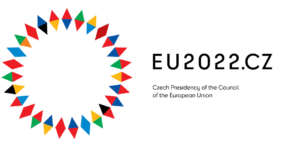
Partners

Media partners
![]()
